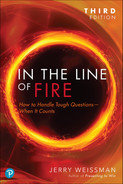Foreword
Baptism Under Fire
I love the urgency of what we do. I like the battles that take place, the jousting!1
Mike Wallace
■ The Grand Inquisitor ■
In the late 1960s, I returned to my native New York from Stanford University with my newly minted master’s degree in speech, drama, and television firmly clutched under my arm, ready to take on the world of media and communications. I was lucky enough to land a job at CBS Television as an associate producer at WCBS-TV, the local flagship station. But my job had less to do with Aristotle, William Shakespeare, and Federico Fellini, all of whom I had studied and fully intended to emulate, and more to do with research and logistics. I spent long hours into the night, every night, reading stacks and stacks of reports, screening hours and hours of archival and new film and videotape, and long days interviewing dozens of people, scouting locations, and scheduling camera crews, equipment, facilities, and reporters.
Mike Wallace arrived at CBS around the same time as I did, although he was on a very different track. He had become a local celebrity for his relentless interrogations of the guests on Night Beat, a late-night interview show on New York’s WABD Channel 5. CBS had yet to launch 60 Minutes, but it was clear that the network programming powers that be intended to leverage Mike’s success with the Night Beat format. They made him a full-fledged correspondent in the elite CBS News unit, where he continued his role as The Grand Inquisitor.
We both worked in the cavernous CBS Broadcast Center on West 57th Street in Manhattan, where Mike’s office was on the sleek main floor, while mine was tucked away in the back of the unglamorous third floor, overlooking the back wall of an automobile dealership. The only time I engaged with the new star was when the network deigned to lend him to our unit from time to time for a day of reporting on the documentary series Eye on New York.
My job was to provide the “talent,” as the correspondents were called, with background information on the story we were shooting and questions for the interviews I had arranged. Whenever Mike bustled onto the location, the belts and buckles of his requisite correspondent’s Burberry trench coat flapping in the air, the first thing he did was to ask for my list of questions. More often than not, he would scan the list, look up, and glare at me to say, “Jerry, these questions are baby puke!”2
■ Tough Questions ■
CBS soon launched 60 Minutes, and Mike, always sharpening his inquisitional ways, burnished his inquisitorial reputation for the next 37 years. The network ultimately produced a laudatory retrospective about “the legendary CBS News correspondent, whose no-holds-barred interview style…helped make ‘60 Minutes’ must-see TV.” They titled the documentary Mike Wallace Is Here, which they described as the “Four words that struck terror into the hearts of shady businessmen and corrupt politicians.”3 Mike also struck terror into the hearts of people who were neither shady nor corrupt: celebrities, entertainers, heads of state, fellow journalists—and me.
Fortunately, I survived Mike’s slings and arrows by learning how to turn up the heat on my lists of questions. Along the way, I also learned how to handle such questions. Eventually, I came over to the other side and started my own company to help businesspeople—like you—handle the slings and arrows that audiences often let fly.
I founded Power Presentations, Ltd. in 1988. To sharpen our mission to help people create persuasive presentations that produce results, in 2018 we renamed the company Suasive, Inc. Now that I have battle-tested these powerful techniques for more than three decades, I offer them to you so that you can survive and even thrive in the line of fire.
